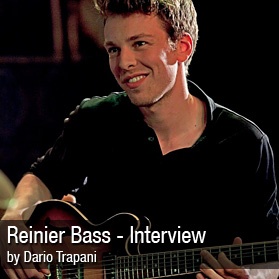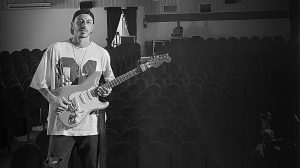Hi folks, after the nice interview with Jonathan Kreisberg by Gianni Salinetti, published in July, here is another episode of “Jazz On” dedicated to the great Reinier Baas, one of the most influential guitarist in the northern european jazz scene; saxophonist Benjamin Herman considers him among the most important figures for the future of the genre and many influential magazines have not failed to praise him in recent years.MusicOff: Please tell us your story: your musical growth and how you met jazz and experimental music.Reinier Baas: I grew up in Holland, Hilversum, close to Amsterdam. My father is a classical bass player, he introduced me to the music of Coltrane, Zappa, Steely Dan. Also. I used to go see him playing live and this had a strong influence on me. As a kid, I began to playi piano but I wasn’t that good so I bought my first guitar at eleven and since then I never stopped. My first heroes were Jimi Hendrix and obviously Django Reinhardt.The music scene in Amsterdam has always been very active, and when I was a teen I started travelling from my city to play at jam sessions and eventually I moved there when I was 18. I joined the Conservatorium van Amsterdam and graduated in 2010 and then I studied at the Manhattan School of Music in New York, for a semester. After that I just kept on studying and working.MO: Have you always been composing music?RB: I used to write stuff before going to school. I tried to find ideas on piano but I didn’t have so many songs. I’m no “Mozart” you know… (he laughs NdR). I began to compose seriously in Amsterdam, when I started my own groups. The songs I recorded are compositions written since 2008, so I always recorded new music. Now I’m writing a lot.MO: You published three records in a row indeed, one every year.RB: Yeah, I try to be as productive as I can. I schedule the recording dates even before I put all the music together. It can be very stressful but this gets you working… Once I decided the band’s line up, I know who I’m writing for and this helps me a lot. MO: Talking about the “music learning environment”, what do you think about attending a school, and them about finding yourself practicing something that maybe has been imposed to you? Schools can teach you a lot of different things, but is this what really matters in your opinion? How can you develop your own style?RB: Many musicians can’t earn enough money by playing only their music so it’s very helpful to have a solid background and being able to play in many styles. Talking about me, if I didn’t go to school, I wouldn’t have done all I did. You can meet many new people, absorb their influence. It’s important! Nowadays, I think this is the best thing to do to become a Jazz musician. On the other hand, you always have to walk you own path, even if you teacher says you must play “that way” before if you want to reach high musical levels.MO: And what do you thing about the innovation/imitation relationship? Listening to your music I notice it is played with traditional instruments, it’s acoustic in most cases, but I also feel a strong desire of emancipation from the Afro-American tradition that your clearly master.RB: Well, thanks! I try to develop both things at the same time, studying traditional material, making my roots stronger, always trying to keep in mind who I am and my artistic aims. You must be a complete, professional musician, being able to play many things but in the end there is something that makes you different from other musicians and when you understand what it is, you must chase and go in depth with it. It’s very important to me to try to express myself, to make real what is in my mind.Something I learned in these years is that I don’t care if people has to take an effort to get into my music. They may need three or four listenings, not necessary a first sight love, but I don’t fell like I NEED to play “easy” for them. I try to write something that unveils new elements during every listening.MO: Ben Street once gave a life changing advice, a simple but effective concept: “You don’t have to listen all the jazz albums you think you need to know. Just listen to what makes you thrill and follows your preferences, do what you really like.” What do you think about it?RB: Totally agree, he’s a giant, a guru! You obviusly have to master your instrument, scales, sound, bla bla bla, but the hardest part is what you want to express.MO: Talking about scales, I heard you developed an alternative system to create scales from arpeggios. What is it?RB: It’s something I try to practice every day. It’s a simple idea and sure I’m not the first one who developed it: i use 18 different modes derived from a Maj7 arpeggio. I begin with 1st, 3rd, 5th and 7th, the fixed notes, while 2nd, 4th an 6th are the variable ones; we have three options for the 2nd (dim, maj, aug), two options for the 4th (perfect or aug) and three for the 6th (min, mag, aug). They are all 7 notes scales, like the major scale, and they can be treated in the same way, developing chords, figure, etc…MO: According to this logic, you have 18 scale of 7 notes that you can play inside the chord, right?RB: Yeah. Not all of them are great sounding, so I try to develop the ones I like most.
MO: Talking about the “music learning environment”, what do you think about attending a school, and them about finding yourself practicing something that maybe has been imposed to you? Schools can teach you a lot of different things, but is this what really matters in your opinion? How can you develop your own style?RB: Many musicians can’t earn enough money by playing only their music so it’s very helpful to have a solid background and being able to play in many styles. Talking about me, if I didn’t go to school, I wouldn’t have done all I did. You can meet many new people, absorb their influence. It’s important! Nowadays, I think this is the best thing to do to become a Jazz musician. On the other hand, you always have to walk you own path, even if you teacher says you must play “that way” before if you want to reach high musical levels.MO: And what do you thing about the innovation/imitation relationship? Listening to your music I notice it is played with traditional instruments, it’s acoustic in most cases, but I also feel a strong desire of emancipation from the Afro-American tradition that your clearly master.RB: Well, thanks! I try to develop both things at the same time, studying traditional material, making my roots stronger, always trying to keep in mind who I am and my artistic aims. You must be a complete, professional musician, being able to play many things but in the end there is something that makes you different from other musicians and when you understand what it is, you must chase and go in depth with it. It’s very important to me to try to express myself, to make real what is in my mind.Something I learned in these years is that I don’t care if people has to take an effort to get into my music. They may need three or four listenings, not necessary a first sight love, but I don’t fell like I NEED to play “easy” for them. I try to write something that unveils new elements during every listening.MO: Ben Street once gave a life changing advice, a simple but effective concept: “You don’t have to listen all the jazz albums you think you need to know. Just listen to what makes you thrill and follows your preferences, do what you really like.” What do you think about it?RB: Totally agree, he’s a giant, a guru! You obviusly have to master your instrument, scales, sound, bla bla bla, but the hardest part is what you want to express.MO: Talking about scales, I heard you developed an alternative system to create scales from arpeggios. What is it?RB: It’s something I try to practice every day. It’s a simple idea and sure I’m not the first one who developed it: i use 18 different modes derived from a Maj7 arpeggio. I begin with 1st, 3rd, 5th and 7th, the fixed notes, while 2nd, 4th an 6th are the variable ones; we have three options for the 2nd (dim, maj, aug), two options for the 4th (perfect or aug) and three for the 6th (min, mag, aug). They are all 7 notes scales, like the major scale, and they can be treated in the same way, developing chords, figure, etc…MO: According to this logic, you have 18 scale of 7 notes that you can play inside the chord, right?RB: Yeah. Not all of them are great sounding, so I try to develop the ones I like most.


 If you move voicings inside these scale you get very interesting sounds. You can begin with an interval combination, i.e. 4th, 7th, 3rd, and move it along the scale. You can use every voicing, every two or three note combination. It helps you to hear new sounds, open the ears to new possibilities.MO: How much time did you spend on this topic? it looks like a huge amount of work!RB: I still have to work a lot on it, that’s a a long term project. You can apply this logic to every four note arpeggio. In theory, there are 18 7-notes scales for every 4 notes chord. I take the better sounding and work on them.MO: Very simple but original! I love your albums titles though, as well as the album content of course. The last track of your first two records are jazz standards played on solo guitar. What about playing solo guitar?RB: I work a lot on the right hand, playing over records and following the drummers’ ride, trying to get the same feeling on chords and single notes. I use the thumb, trying to get a piano-like or polyrhythmic effect. I’ve been woking on fingerpicking lately, for solo or duo gigs. I don’t usually play my guitar solos with bands without the pick but I try instead to use the fingerstyle techniques for more “guitar arranged” or harmonic stuff.
If you move voicings inside these scale you get very interesting sounds. You can begin with an interval combination, i.e. 4th, 7th, 3rd, and move it along the scale. You can use every voicing, every two or three note combination. It helps you to hear new sounds, open the ears to new possibilities.MO: How much time did you spend on this topic? it looks like a huge amount of work!RB: I still have to work a lot on it, that’s a a long term project. You can apply this logic to every four note arpeggio. In theory, there are 18 7-notes scales for every 4 notes chord. I take the better sounding and work on them.MO: Very simple but original! I love your albums titles though, as well as the album content of course. The last track of your first two records are jazz standards played on solo guitar. What about playing solo guitar?RB: I work a lot on the right hand, playing over records and following the drummers’ ride, trying to get the same feeling on chords and single notes. I use the thumb, trying to get a piano-like or polyrhythmic effect. I’ve been woking on fingerpicking lately, for solo or duo gigs. I don’t usually play my guitar solos with bands without the pick but I try instead to use the fingerstyle techniques for more “guitar arranged” or harmonic stuff.
I apply this on standards and other stuff, trying to be as free as I can, both technically and visually.MO: Do you have a study routine?RB: Yes. When I was going to school I used to pick up my guitar and play anything that came to my mind, focusing on what I couldn’t play well. But now I have a little study plan that works for me: mainly technique and fingerboard visualization. I have different exercises that help me to play more freely, to move chords over scales as we told before, different voicings, scales and keys. I move them diatonically, then I change string set, on and on. Sometimes you find excessively wide open positions, but you can arpeggiate it, play it melodically.When I practice I try to relate every note with the root, modally. I often try to sing the combinations before playing them, then I check on the guitar. Besides this I work a lot on 4 notes chords created over scales, trying to play them in every drop position I know. I practice a lot on scales too, very slowly, legato and dynamically even. I try to put accents every 3 or 4 notes too… I work on all positions, with alternate picking. Really basic stuff, indeed…I also work a lot on my sound; I think that the heart of the sound of a guitar player is in his right hand. I practice not to press too hard with the left hand, sure, but most of my exercises are about pick control, angle, strength and velocity. I just want sound the same on every guitar. I use to practice this stuff every day, along with some reading exercises. I’m not a good reader, but it’s getting better all the time. MO: Last question: would you recommend to readers five cd of any kind?RB:• Glenn Gould – “Art Of The Fugue” (insieme a tutti gli altri dischi su Bach)• Louis Lortie – “Ravel Piano Works”• John Coltrane – “A Love Supreme”• Jakob Bro – “Balladeering”• Kendrick Lamar – “Good Kid, Mad City”Reinier Bass Official WebsiteGO TO THE INTERVIEW IN ITALIAN/VAI ALL’INTERVISTA IN ITALIANO
MO: Last question: would you recommend to readers five cd of any kind?RB:• Glenn Gould – “Art Of The Fugue” (insieme a tutti gli altri dischi su Bach)• Louis Lortie – “Ravel Piano Works”• John Coltrane – “A Love Supreme”• Jakob Bro – “Balladeering”• Kendrick Lamar – “Good Kid, Mad City”Reinier Bass Official WebsiteGO TO THE INTERVIEW IN ITALIAN/VAI ALL’INTERVISTA IN ITALIANO

Jazz On! – Reinier Baas interview
Hi folks, after the nice interview with Jonathan Kreisberg by Gianni Salinetti, published in July, here is another episode of "Jazz On" dedicated to the great Reinier Baas, one of the most influential guitarist in the northern european jazz scene; saxophonist Benjamin Herman considers him among the most important figur









Aggiungi Commento